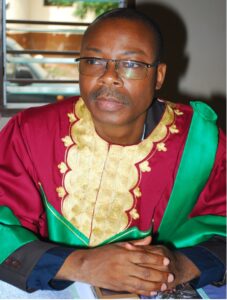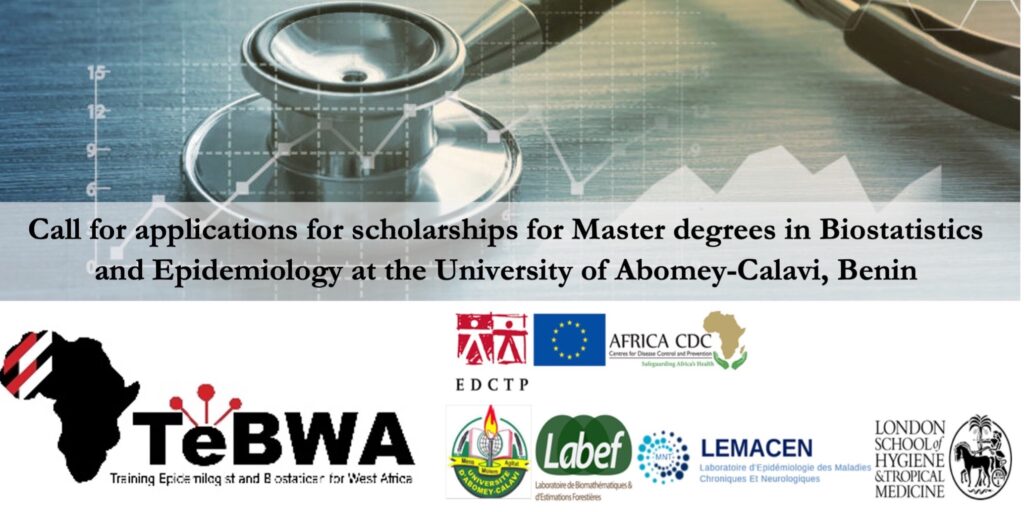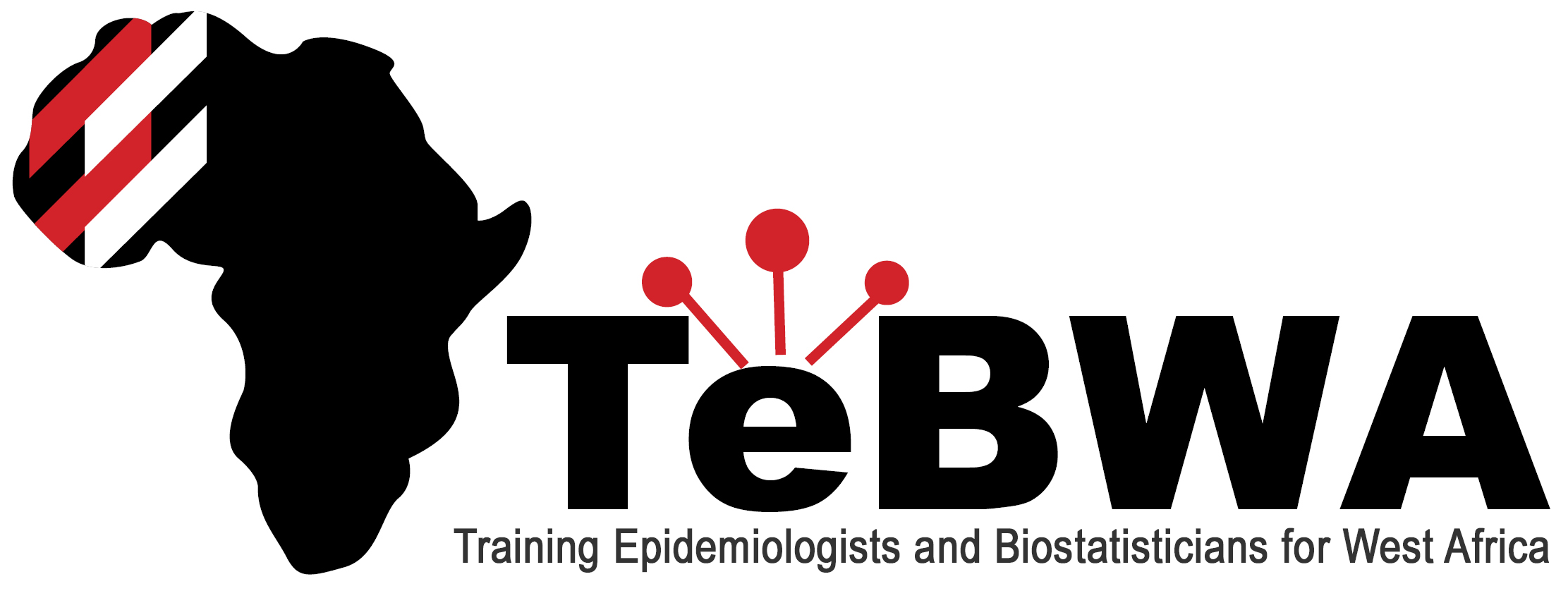From 20 th to 21 st 2024, the project “Training epidemiologists and biostatisticians for enhanced response to disease
outbreak and epidemic in west Africa – TEBWA”, one of the EPI fellow projects funded by EDCTP2 had their closing workshop at the Millenium Popo Beach Hotel, Agoue, in Benin.
The TEBWA project is run by the University of Abomey-Calavi in Benin in consortium with the London School of Hygiene and Tropical Medicine (LSHTM, England), and the National Agency for Primary Health Care of the Ministry of Health (ANSSP/MoH, Benin), and aims to train 15 Masters level specialists in Epidemiology and Biostatistics for West Africa.
The closing workshop aims to: (i) summarize the achievements, lessons learnt from the project, and perspectives, (ii) share results of the research conducted by the Master students of the project, and (iii) engage stakeholders on the sustainability of the project.
On day 1, the opening ceremony was marked by several speeches namely from the project coordinator (Prof. Romain Glèlè Kakaï), the Honorary Director of the Doctoral School in Health Sciences of the University of Abomey-Calavi (Prof Dismand Houinato), and the Director of the Doctoral School of Agronomic and water Sciences (Prof Marcel Houinato). All speakers recognized the merits of the TEBWA project, the immense support of the EDCTP2, and wishes that this collaboration continues.
The achievements, lessons learned, and perspectives of the project were presented as well as the feedback received from TEBWA fellows about the project implementation, the support they received, the impact of the project on their capacity, the project activities, and suggestions for improvement. Discussions revolves around the creation of a network of West-African Biostatisticians and TEBWA alumni (which are already ongoing) as well as the creation of a Centre/Institute of Epidemiology and Biostatistics.
Then seven out of the fifteen TEBWA fellows presented the results of their research which covered statistical and mathematical modelling as well as meta-analysis on diseases such as COVID-19, Lassa Fever, Cholera, and Malaria. They received comments from experts in Epidemiology and Biostatistics to improve their manuscripts that are currently being prepared.
In the last session, the TEBWA fellows and participants were trained on “Geospatial and web-based mapping of health outcomes with R”. This training was led by Prof. Justice Moses K. Aheto who is Associate Professor at the Department of Biostatistics (University of Ghana, Accra).
Prof Romain Glèlè Kakaï, the coordinator of the TEBWA project has joined the Vaccine Impact Modelling Consortium as a group lead on Malaria.

Professor Romain Glèlè Kakai is a Full Professor of Biostatistics and Forest Estimations at the University of Abomey-Calavi. He is the PI of the EDCTP2-funded project “Training Epidemiologists and Biostatisticians for enhanced response to disease outbreak and epidemic in West-Africa (Acronym: TEBWA)” (CSA2020E-3131 — TEBWA, 2021 – 2024; http://tebwa.labef-uac.org/).
As a reminder, WHO is starting in 2023 vaccination against malaria in the 117 countries where malaria is endemic. There has been a request for proposals from GAVI (Global Vaccine Alliance) and WHO through VIMC (Vaccine Impact Modelling Consortium) for the development of a mathematical model and associated computer code to predict the number of malaria cases, the number of severe cases, the number of hospitalisations, the number of deaths due to malaria and the number of days of physical inactivity due to malaria, all for each age cohort from 0 to 100 years for each of the 117 countries in the world and for each of the years from 2023 to 2100, taking into account the density of mosquitoes, the number of bites per person per year, the natural mortality rate, the birth rate, the population growth rate, the rate immigration and emigration, etc and under different malaria vaccination scenarios (Vaccine coverage, % vaccine efficacy, age cohorts to be vaccinated, booster vaccination 2 years later (booster), etc.) and the epidemiology of malaria in each country.
Prof. Romain Glèlè Kakai proposed a hybrid mathematical model that has been selected by the VIMC and he has been appointed a group Lead on Malaria modelling. It should be noted that a total of 3 models were selected. A model from an Australian and another from a Swiss. More details can be found on this link: https://www.vaccineimpact.org/2023-05-16-eight-new-groups/
He also participated to secure several other collaborative fundings aiming at building capacity of African youth in Biostatistics and infectious disease modelling in Africa. For example, he is participating to (i) the Sub-Saharan Africa Consortium DELTAS Africa II that received a Pan-African grant (funded by AU) for Advanced Biostatistics training; the (ii) the “One Health Project and Health Risk Analysis (OHARIS)” in Benin, and the (iii) INSPIRE-UAC (INnovation Santé Publique Internationale Recherche Enseignement).
Our warmest congratulations to Prof. Romain Glèlè Kakai for these milestones and best wishes.
An intensive 5-days workshop of the TEBWA project: capacity building in mentoring and systematic reviews and fellows’ proposal review
The TEBWA project involves two M.Sc. programs, and the project fellows are expected to carry out research at the end of their training. To ensure that their fellows complete quality research and on time, the project has scheduled a workshop to evaluate the students’ research protocols. In addition to excellence in academic training, the TEBWA project puts a strong emphasize on supporting its fellows to succeed in their professional life. For this purpose, the project has also put in place a mentoring program for its fellows. As such, each fellow has been assigned a mentor. The aim of the mentoring program is, among other, to enable the fellows to benefit from the experience, network, and guidance of their mentors, to ensure the success of their academic studies and, above all, better integration into the professional life. To this end, the project also planned a training for mentors and mentees on the principles, tools, and techniques for successful mentoring.
The short-term objectives of this workshop were to :
- evaluate the research protocols of the project fellows,
- provide constructive review for the fellows to improve their research proposals,
- train TEBWA fellows on principles and techniques to perform a systematic review
- train TEBWA fellows and their mentors on the principles, tools, and techniques for successful mentoring.
In the medium term, this workshop aimed to enable the fellows to complete their dissertations on time and maximize the benefits of mentoring.
The workshop took place from 20th to 24th March 2023 at GANNA Hôtel, Grand Popo. The project coordinator Prof Romain GLELE KAKAI and Professor Dismand HOUINATO (coordinator of the master program in epidemiology and public health interventions) gave the opening remarks. The training on the mentoring was given for three days by Dr Eric AGOYI (an international expert) who was supported by Prof Flora CHADARE (an invited guest from the National University of Agriculture of Benin). On the day 4, the TEBWA fellows presented their research proposal. They received comments and suggestions from the project team members and other experts that were invited. Finally, Dr Valère SALAKO (the PI-assistant) train the fellows on the principles and techniques to perform a systematic review. The workshop was closed by a short meeting of the coordination team.
Foreign students celebrate the new year as if they were in their home country
The Master programme in Biostatistics and the PhD programme in Biometry of the doctoral school of agronomic sciences and water of the University of Abomey-Calavi (Republic of Benin) every year attract several students from different countries in Sub-Sahara Africa. The students are supported (through scholarship) by many programmes. Currently ongoing programmes which support foreign students include the DAAD In-Country/In-Region Programme in Developing Countries and the EDCTP – European and Developing Countries Clinical Trials Partnership.
As these students are far from their families, parents, and friends in their country, they might feel “lonely” during the celebration of the new year. It is with this background that the coordinator of these two training programmes, Prof. Romain GLELE KAKAÏ invited all the foreign students that stayed in Benin to celebrate the new year. Five students supported by the EDCPT project TEBWA were part of this celebration.
It was a very pleasant time, and all participants were happy and wished that this kind of this initiative to be sustained.
TEBWA fellows, members of LABEF and foreign students in different training programmes at LABEF gathered at Cotonou Beach for a relaxation time
TEBWA fellows, members of LABEF and foreign students in different training programmes are very committed and hardworking people. After a period of hard work, they gathered at Cotonou Beach for a relaxation time. Far from their books and computers, they had fun, danced, socialized, and enjoyed special dishes made in Benin.
TEBWA project team members shared their experiences and success stories with TEBWA fellows
After one year of hard work, it was necessary to gather TEBWA fellows for a relaxation time. The project team organized a two-days meeting at Grand-Popo, a coastal city in southern Benin. The project team members which are experienced, and renowned scientists, shared their experiences and success stories with TEBWA fellows. The fellows also presented their road purpose map. The idea was to inspire the fellows and encourage excellence. It was also a relaxation time for project fellows and team members.
TEBWA scholarships programme : List of grantees
The coordination of the project “Training epidemiologists and biostatisticians for enhanced response to disease outbreak and epidemic in west Africa – TEBWA” is pleased to inform the following persons that they have been selected to join the training programmes in Biostatistics and Epidemiology.
Grantees for the Master programme in Biostatistics
| Nr | Last_name | First_name | Nationality | Gender |
| 1 | AGBI | Delight Mawufemor | Ghana | Female |
| 2 | AMOUSSOUVI | Koomi Toussaint | Benin | Male |
| 3 | OKEY | Gaëlle Manuela | Benin | Female |
| 4 | OYEDELE | Habeeb | Nigeria | Male |
| 5 | SESAY | Marwan, Vaphy | Liberia | Male |
| 6 | SINLETE | Ghislaine Akoua Maryline | Benin | Female |
| 7 | TUO | Ouanan Nicolas | Côte d’Ivoire | Male |
| 8 | ZANVO | Setondji Diane Edwige | Benin | Female |
Grantees for the Master programme in Epidemiology and Public Health interventions
| Nr | Last_name | First_name | Nationality | Gender |
| 1 | ABDOU NEINO | MOUSSA | Niger | Male |
| 2 | DIALLO | Rouguiatou | Guinée | Female |
| 3 | Coulibaly | Bakary | Mali | Male |
| 4 | DOVOEDO | Elodie | Benin | Female |
| 5 | FASSINOU | Marc Syeven M | Togo | Male |
| 6 | OBOSSOU | Rebecca Bertille Kadoukpè | Benin | Female |
| 7 | SALLAN | Ortiz | Benin | Male |
Call for applications (TEBWA scholarships)

Context
Reliable epidemiological data are often unavailable or severely limited in sub-Saharan Africa. This knowledge gap is further aggravated by a shortage of skilled personnel in epidemiology and biostatistics to efficiently monitor, analyse and interpret epidemiological data to inform policy and decision making. The 2019 coronavirus disease pandemic (Covid-19) has further revealed the lack of skilled human resources to effectively deal with epidemics in sub-Saharan Africa. It is therefore necessary to train epidemiologists and biostatisticians for sub-Saharan Africa, capable of working in collaboration with national health departments and national public health agencies. They should also be able to work in collaboration with international organizations such as the World Health Organization’s Regional Office for Africa, the West African Health Organization (WAHO), and Africa Centres for Disease Control and Prevention (Africa CDC), to collectively conduct routine surveillance, conduct public health research and respond effectively to epidemics.
The University of Abomey-Calavi in Benin (through the Laboratoire de Biomathématiques et d’Estimations Forestières – LABEF / FSA / UAC, and the Laboratory of Epidemiology of Chronic and Neurological Diseases – LEMACEN / FSS / UAC) in consortium with the London School of Hygiene and Tropical Medicine (LSHTM, England), and the National Agency for Primary Health Care of the Ministry of Health (ANSSP/MoH, Benin), secured funding from the 2nd European and developing countries Partnership for clinical trials Program (EDCTP) to implement the project “Training epidemiologists and biostatisticians for enhanced response to disease outbreak and epidemic in west Africa – TEBWA”. This project aims to train 15 Masters level specialists in Epidemiology and Biostatistics for West Africa.
This call for applications is for the recruitment of candidates for the Master in Biostatistics (08) and the Master in Epidemiology and Interventions in Public Health (07) for the academic year 2021-2022. Selected candidates will benefit from living expenses for two years as well as research costs, airline tickets for international candidates (round trip once between the candidate’s country of origin and Cotonou in Benin) and an attractive and competitive framework for mentoring, tutoring, and research in Biostatistics and Epidemiology. The courses of the Master in Biostatistics are entirely taught in English, while the courses of the Master in Epidemiology are entirely taught in French. The two courses (Master in Biostatistics, Master in Epidemiology and Public Health Interventions) will take place on the campus of the University of Abomey-Calavi, based in Benin. The selected candidates from francophone (respectively anglophone) countries will also benefit from an initial training in English (respectively French) in the form of intensive courses in order to be able to follow the courses normally.
Who can apply?
This call is open to people with a diploma equivalent to at least a Bachelor’s degree in the fields of Life Sciences (agronomy, environment, health, epidemiology, pharmacy, etc.), or in Mathematics / Statistics and wishing to acquire knowledge and know-how in Biostatistics and Epidemiology.
Components of the application file
- A motivation letter from the applicant indicating the selected Master’s degree (Biostatistics or Epidemiology and interventions in public health)
- An up-to-date curriculum vitae (template downloadable here: please complete, sign, and scan)
- Certified copies of the baccalaureate diploma and all other higher education diplomas
- Certified copies of transcripts from the baccalaureate and all university years
- A letter of recommendation
- A letter from hierarchical superior indicating that the applicant has the support of his home Institution and that he will be able to return to the institution once the studies are completed (for civil servants).
Submission of the application file
All application materials must be submitted:
- Online using this link (https://bit.ly/3soBH1x). This form is to be filled in by all applicants.
- By physical deposit at the secretariat of the Laboratoire de Biomathématiques et d’Estimations Forestières – LABEF / FSA / UAC every working day from 9:00 a.m. to 12:00 P.M. and from 1:00 P.M. to 4:00 P.M. for the master’s degree in Biostatistics.
- By physical deposit at the administrative secretariat of the doctoral school of health sciences every working day from 9:00 a.m. to 12:00 p.m. and from 1:00 p.m. to 4:00 p.m. for the Master in Epidemiology and interventions in public health.
Application deadline
Applications must be submitted no later than September 10, 2021 at 5:00 p.m. GMT
Selected candidates will be notified no later than September 25, 2021 at 5:00 p.m. GMT. The intensive English/French courses will start on October 11, 2021 and the courses will start on December 1, 2021.
Additional information
For any other information, please send an email to: tebwa2021@gmail.com
Female candidates are strongly encouraged to apply!
